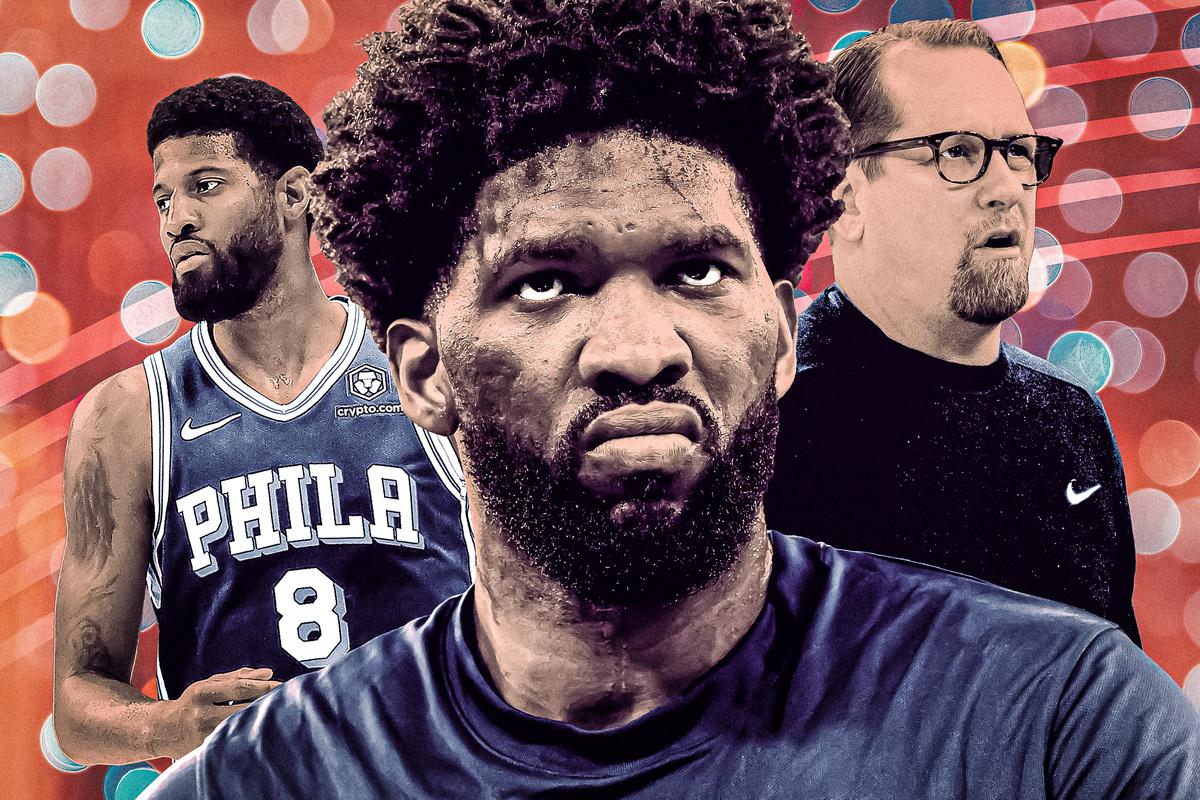
Forget, for a moment, the Shove heard (but not seen) round the internet. Forget the inciting column that drove Joel Embiid to put his hands on a Philadelphia journalist. Set aside, for now, how you feel about the appropriateness of the columnist’s words or the appropriateness of assaulting someone over those words.
There’s a lot to sort through—professionally, morally, and spiritually—in the reported dustup between Embiid, the Sixers’ franchise star, and Marcus Hayes, The Philadelphia Inquirer’s longtime columnist, in the Sixers’ locker room Saturday night. We’ll leave it to NBA officials to determine what, exactly, Embiid did and what discipline is justified. As for Hayes’s column? People can make their own judgments.
But there is nothing murky or debatable about the rising tension threatening to engulf the Sixers’ once-promising season, just 12 days after it began. Embiid’s shocking meltdown just added another layer of chaos and uncertainty.
Remember when we all declared (justifiably) that the Sixers won the offseason by landing Paul George? That they were one of a handful of legit title contenders? Yeah, that all seems like a long time ago.
As of Monday morning, Philadelphia has one win in five games and the worst point differential in the Eastern Conference. Neither George nor Embiid, each coping with knee issues, has played a single game (though George reportedly could play as soon as Monday night).
But Embiid has been churning out headlines nonetheless—by missing the entire preseason, by drawing a technical foul while sitting in street clothes, by refusing to speak to the media for 28 days to explain his health status, by indirectly causing the NBA to investigate and then fine his employer $100,000 for its obfuscation of Embiid’s status, by unleashing a profanity-laced response to critics when he finally did speak on Friday, and then by shoving Hayes after the Sixers lost to the Memphis Grizzlies on Saturday. (Full disclosure: I serve as president of the Professional Basketball Writers Association, a role that includes lobbying the NBA on player availability and media access.)
The first glimpse of good news on the Embiid front came Thursday, when he took part in a five-on-five scrimmage, an indication that his season debut was close. Now that moment will be delayed by an almost certain (perhaps multigame) suspension, and his return will be clouded by his off-court actions.
It wasn’t supposed to be this way. (“I think this may be the best team we’ve had,” Sixers owner Josh Harris told The Ringer in July, beaming after adding George to Embiid and Tyrese Maxey.) But then, things have rarely gone according to plan since Embiid arrived in Philly in 2014, as the third pick in the draft and the physical embodiment of “the Process,” the multiyear tank job aimed at landing a franchise superstar.
And Embiid has been exactly that. A seven-time All-Star. A five-time All-NBA selection and three-time All-Defensive team selection. The NBA’s MVP in 2022-23 and a near-perennial candidate for the award. The Sixers and their fans have gotten everything they could have hoped for … except consistent availability and, well, a championship, two glaring asterisks that are indisputably intertwined.
Over the past eight years, Embiid has played in just 68 percent of the Sixers’ regular-season games. In that time, the Sixers have made five trips to the conference semifinals—and never beyond. The relentless criticism that so stings Embiid, in Philly and elsewhere, all stems from those two data points. That Embiid is so often banged up for those playoff failures only adds to the frustration, for Embiid and fans alike. Healthy or not, Embiid’s production has lagged at all the worst times.
Were there often extenuating circumstances? Some bad luck? Ill-timed injuries? Costars (hello, James Harden and Ben Simmons) who gagged at all the wrong times? Sure. But in the NBA, the franchise star always gets too much credit for success and too much blame for failure. It’s a time-honored tradition.
Yet it’s faulty—objectively inaccurate—to pin all the Sixers’ woes on the man they call the Process. It wasn’t Embiid’s decision to let Jimmy Butler leave in 2019, or to draft Markelle Fultz with the no. 1 pick in 2017. Embiid isn’t responsible for Simmons souring on the franchise and demanding a trade in 2021, or for Harden souring on the franchise and demanding a trade in 2023. Embiid isn’t the one who churned through six—six!—heads of basketball operations in 10 years. There are dozens of fingerprints on this crime scene.
What Embiid can control in this latest saga—yet, to his detriment, has stubbornly chosen not to—is his own narrative. Or more accurately, the narrative affixed to him by fans and pundits who have grown skeptical of his commitment, his professional pride, and his competitive drive. That Embiid is choosing to sit out, to rest, to load manage.
Here’s the truth that Embiid won’t admit, that Sixers officials dare not verbalize, even at the risk of getting fined: He’s injured. The knee he had surgically repaired in February, which he played on with clear limitations (and a brace) throughout the playoffs and the Olympics, still isn’t right. It might never be right. Like Kawhi Leonard (who also never discusses these things), Embiid might very well be dealing with chronic issues for the rest of his career.
If this isn’t abundantly clear, well, now you can blame Embiid outright. For whatever reasons—pride, privacy, contract concerns—Embiid has been notoriously protective of his health status throughout his career. He doesn’t want his injuries discussed or explained, by anyone. Every Sixers administration has bowed to those wishes, repeatedly obfuscating on his behalf—even to the extent of euphemistically using the term procedure in place of the more accurate surgery for Embiid’s meniscus repair in February. In recent weeks, the Sixers have attributed Embiid’s lack of game action to a vague “left knee condition.”
Just connect the dots on the NBA’s (muddled, dizzying) statement last week announcing the $100,000 fine against the Sixers. According to the league, Sixers officials were guilty of making “public statements … that were inconsistent with Joel Embiid’s health status.” Translation: They lied when they said he was held out of games for “injury management,” as opposed to, well, an actual injury. They lied when they said he had experienced no setbacks to his knee, because he obviously has.
In that same press release, the NBA said its investigation “confirmed that Embiid has been unable to play” in regular-season games—and therefore that the Sixers are not violating rules aimed at curbing player “rest.” In its own obnoxiously bureaucratic way, the NBA is telling us that Joel Embiid is, in fact, injured. Not resting. Not load managing. Not being cautious. And not choosing to sit out to protect his ego or his stats. Just injured.
But Embiid turned down dozens of opportunities to make that clear last month. After speaking to reporters on October 3, the third day of training camp, Embiid went four weeks without agreeing to an interview, leaving an increasingly testy coach Nick Nurse to answer (or more often, evade) all questions about his status as he missed game after game. Team officials are limited in how much they can disclose without a player’s consent. That’s why Nurse was so curt with reporters last week. He knew more than he could say.
So much mystery, so much controversy—all of it unnecessary and within Embiid’s control. Anyone who has watched him over the years can see how much passion he has for the game. We’ve seen him at his most joyful in victory and literally in tears in defeat. We’ve seen him play through a broken face, obvious knee pain, and a bout of Bell’s palsy. There’s nothing soft about Embiid. And yet he lets that negative image take hold—in columns and debate shows and Twitter replies—through his own reluctance to admit a physical frailty.
Whatever is going on with Embiid’s knee, he did rejoin practice last week, and he is, it seems, nearing the stage where he’ll be able to play again—and presumably dominate again. Perhaps then the wins will come, the criticism will subside, and the Sixers will play like the title contenders they were projected to be.
It’s a long season. By next spring, we might well have forgotten about this ugly start and the even uglier recent scene in the Sixers’ locker room. In the meantime, the intense scrutiny and the immense pressure will persist. That’s part of the burden that comes with NBA stardom. Embiid won’t play every game, but there’s plenty of time to repair his rep and restore faith. He might even lead the Sixers to a championship. For now, Embiid could do himself, his team, and his anxious fans a huge favor with a much less taxing exercise: He could just tell the truth about his health.


